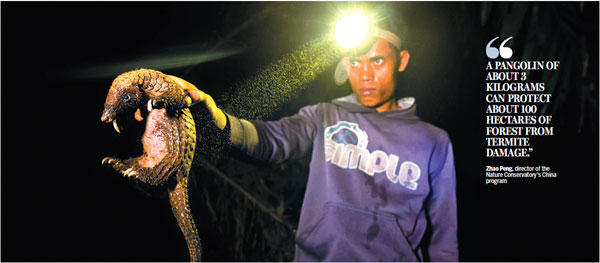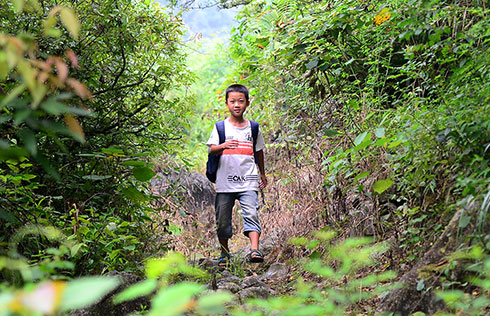Kung fu star aims a blow at pangolin poachers
|
|
Last year, the 17th CITES Congress adopted a proposal that all eight pangolin species be elevated from Appendix II to Appendix I, which effectively bans all international trade of pangolins and their products.
China has placed the animals under the second-highest level of national protection, and they could soon be promoted to the highest level. On Dec 27, customs officials in Shanghai seized 3.1 metric tons of pangolin scales, equivalent to up to 7,000 dead pangolins, while Hong Kong customs officers seized 7.2 tons of suspected pangolin scale products early this year.
A wider aim
"A pangolin of about 3 kilograms can protect about 100 hectares of forest from termite damage," said Zhao Peng, director of the Nature Conservatory's China program. "To protect this endangered species is to protect the ecosystem."
The protection of wild fauna and flora constitutes a prominent part of the nation's development strategy, added Li Qingwen, secretary-general of the China Wildlife Conservation Association.
Since 2000, the association, which is part of the State Forestry Administration, has supported or conducted a series of scientific investigations into the status of pangolins, as well as poaching and trafficking. This has provided a solid foundation for government legislation and law enforcement.
The battle against wildlife poaching and smuggling is already bearing fruit, according to Peter Knights, founder and executive director of WildAid.
Since 1995, the organization has been working with Chan to raise awareness of endangered species worldwide. Under the slogan "When the buying stops, the killing can too", WildAid has gained global support.
Shark fin consumption has plummeted in the past three years, with China's shark fin imports falling by 81 percent, Knights said. A total ban on ivory processing and sales in China will be effective from the end of the year, a move that has been widely praised by the international community, he added.
With more stringent legislation and law enforcement, the ivory smuggled into the country last year fell by 80 percent, while ivory prices on the black market in Kenya and other African countries fell by more than 60 percent, resulting in a 75 percent decrease in elephant poaching.
Similarly, underground prices for rhinoceros horn are about a third of what they once were, according to Knights.
"This is the result of the joint efforts made by Chinese government agencies and their partners, and we hope that such efforts will have the same effect in protecting the pangolins," he said. "We are very grateful to the General Administration of Customs for its great contribution in combating the illegal trade of pangolins and other wild species."
Knights is now calling on all countries to strengthen legislation and to fight pangolin poaching and public consumption with stronger law enforcement at the international level.
























